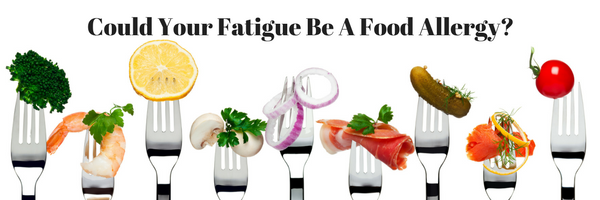Food allergies are a taboo subject here in Australia and yet a popular one. We have gained first place for the food allergy capital of the world4!
Now, the subject of food allergy can cause your health professional or family member for that matter to roll their eyes at you in a dismissive way.
But this for me, and for you, because you are reading this right now is anything but a joke.
Estimates suggest that there has been a four-fold increase in anaphylaxis to food (life threatening reaction to an allergen) in Australia since 1999, with this figure rising every single year4.
And here’s the thing.
Food allergy does not have to cause life-threatening reactions it can also cause symptoms such as rashes, itching, headaches, fogginess and you guessed it fatigue.
So you wake up in the morning and have had somewhat of a good sleep.
You then quickly get your breakfast ready, have a cup of coffee and head off to work. As the day tracks along it seems quite average. Up comes a random bout of fogginess, headache and fatigue at midday “must be not drinking enough water” you might say and then you forget about it.
Another ordinary day comes along this time at night that fogginess returns with a blocked nose, headache and fatigue.
Now, this scenario can repeat itself over and over again with slightly different reactions each time and yes, your mind starts to normalize it you get used to it or you associate it with something else in your life.
And then..
There comes a time when this is happening to often and you begin to question..
“why am I so tired, this surely can’t be normal and what are all these other reactions?”

Once you’re fed up with feeling fatigued, you of course look into it further.
Your doctor runs a series of blood tests all coming back normal with the label of perfect health stamped on your file.
Out come some general recommendations to exercise, eat a balanced diet and take some rest.
Let’s hope you don’t get the comment of “your getting older, this is normal”.
You then give these a good go or your doing them already.
But to no avail the fatigue is still there.
And the decision is made. It is time to take matters into my own hand.
You do some investigations of your own and out comes doctor Google.
I am all for the freedom of health information to the public. The Internet drives awareness and provides insight to how the body works that has never been so easily available.
Lets face it though,
It is confusing at best as any one can write anything on there.
Coupled with nutrition being a world of contradictions, it’s hard to sort through it all.
You persevere, try a few things and get a little bit of a result but the majority of your fatigue still remains.
You can probably predict what I am going to say next.
The truth is…
Fatigue can be caused by a lot of factors one of them can be reactions to food.
The problem is that food reactions come in different forms and can be hard to pinpoint but not if you follow the right approaches to find them.
Now, there needs to be an understanding of what types of food reactions can occur.
As there can be food allergy and there can be food intolerance (both are referred to as being allergy, commonly). This is important as fatigue can be caused by food intolerance and true food allergy 1,2.
So ‘true’ food allergy is when the immune system mounts a response much like being poisoned (this is the anaphylaxis I was referring to prior) and can occur in varying degrees of severity. So symptoms such as the following are associated with allergy2:

- Difficulty breathing
- Nausea/vomiting
- Headache
- Hives
- Itchy, watery eyes
- Diarrhea
- Chest pain
- Pale, blue skin
- Dizziness/fainting
- Fast heart beat
- Swelling of the mouth/throat
These symptoms are associated with feeling very tired, especially when recovering from reactions.
If any of these symptoms are occurring please see your doctor or if breathing difficulty is severe call an ambulance. This is where an IgE food allergy test needs to be performed.
These symptoms remind me of a client that was getting itchy reactions on the skin similar to hives and fatigue shortly after some meals. Together, we went over their food diary and found that each time it occurred sesame was unknowingly part of the meal.
Upon referring to get an IgE food allergy test we found a positive to sesame seed, then educated on removing the food and “hey presto” symptoms gone.
Food intolerance is associated with the digestive tract and other systems within the body that cause less serious symptoms. These symptoms are usually delayed by hours to days after the food is eaten (which increases the confusion)2,3. The symptoms associated with food intolerance can be2,3:

- Bloating
- Hives
- Nasal congestion
- Headache/migraine
- Palpitations
- Nervousness
- Asthma-like symptoms
- Sweating
- Ulcers
- Burning sensation on the skin
- Diarrhea
And of course chronic fatigue
An example of this was a client I saw a few months ago with random bouts of fatigue, headaches, fogginess and a history of sinusitis.
I suspected food intolerance due to the headaches coinciding with a group of foods steadily increasing in the diet. These foods were amine rich foods such as cheese, red wine, aged meats and chocolate.
Since food intolerances commonly need to be consumed often and/or in large amounts3 to cause a reaction the client never experienced symptoms prior to this increase.
Together, we removed this group of foods and the client’s energy steadily came back.
The headaches were a rare occurrence and were usually associated with a large chocolate lapse…
HOW DO YOU FIND OUT IF YOU ARE SUFFERING WITH FOOD ALLERGY OR INTOLERANCE?
If you are suffering from random bouts of fatigue, other confusing symptoms, all the right checks have been done by your GP and you are fed up with being tired then perhaps it is time to investigate for food allergy/intolerance.
Find an experienced practitioner that knows what tests need to be done and the right approaches to take to restore you back to health.
If you know now is your time to finally take control of your health once and for all so you don’t have it hanging over your head anymore and you know that you need support through the process then take our team up on their free initial consultation where they can show you what will be the best process for you to get the lasting change your looking for.
Tips before your consult:
- Take detailed notes of your symptoms anything strange happening of late?
- Keep a detailed food diary for a week or two
- Note down when the symptoms first started, what else changed at that time?
In Health,
Victoria
P.P.S Please share this with those that you know who need to read this.
Reference:
- ACAAI,Wheat Allergy, <http://www.acaai.org/allergist/allergies/Types/food-allergies/types/Pages/wheat-allergy.aspx >, 2014 (accessed on 26 October 2017).
- ASCIA,Food Intolerance, <https://www.allergy.org.au/patients/food-other-adverse-reactions/food-intolerance>, 2014 (accessed on 26 October 2017).
- Better Health Channel,Food Allergy and Intolerance,<https://www.betterhealth.vic.gov.au/health/conditionsandtreatments/food-allergy-and-intolerance>, 2017 (accessed on 26 October 2017).
- M. L. K. Tang & R. J. Mullins,Intern Med J,2017 47 (3) 256-261.






